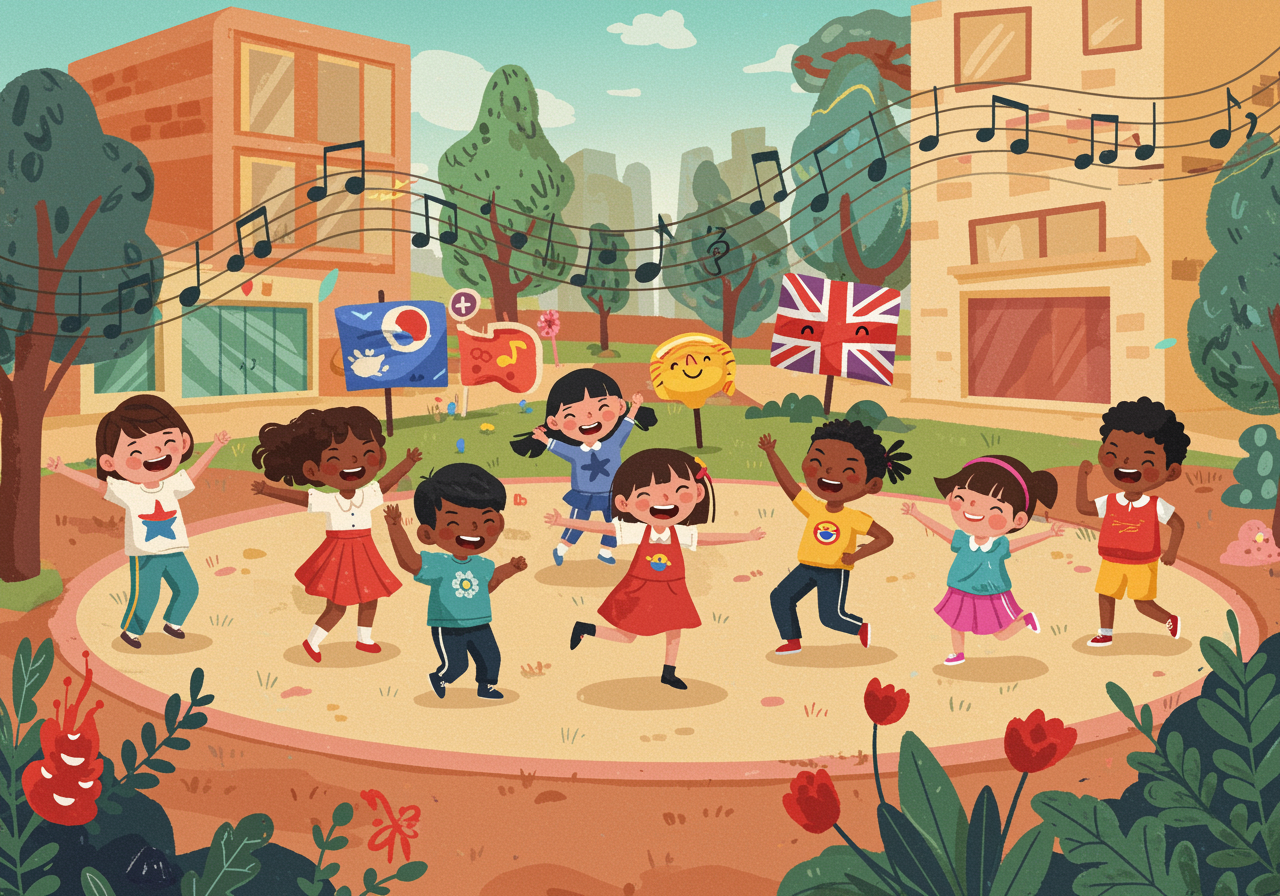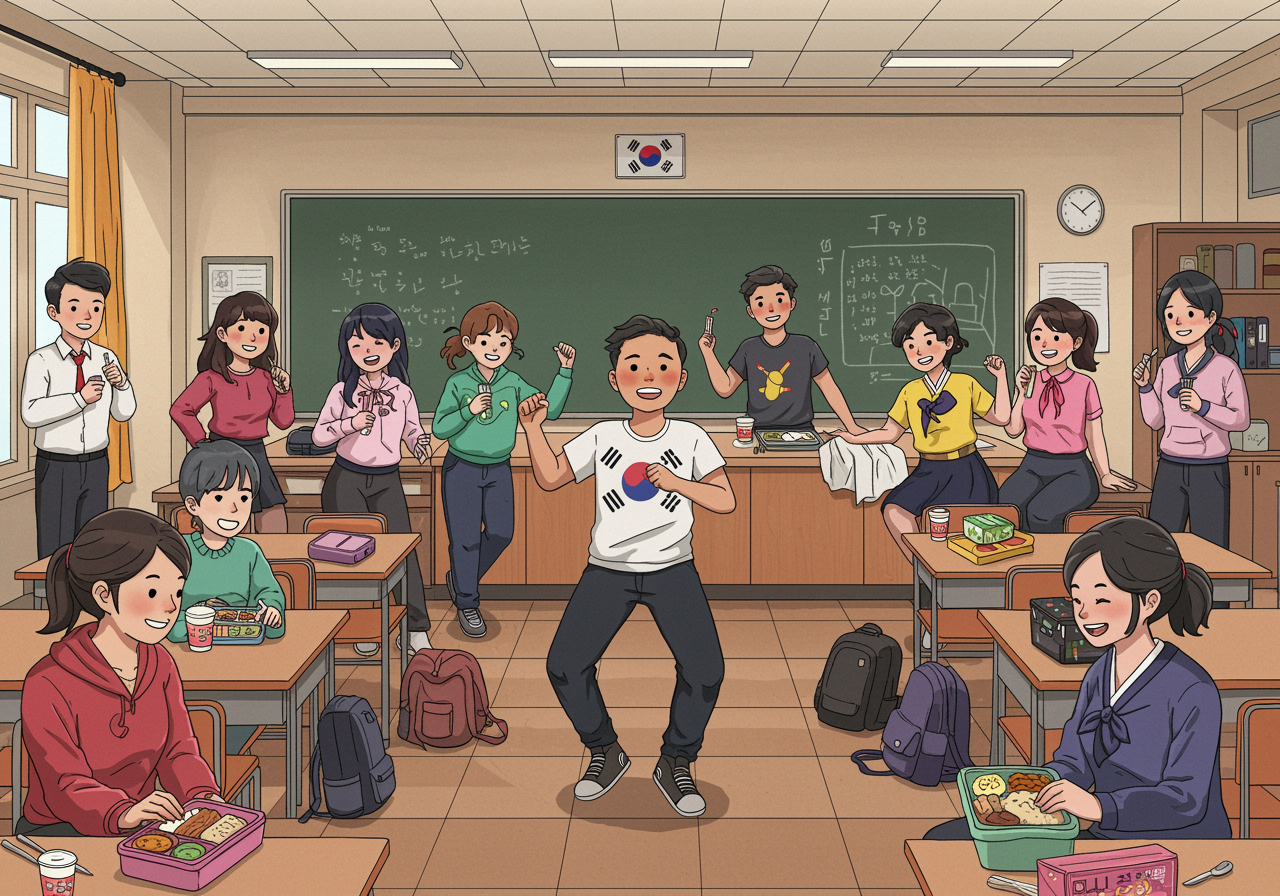The K-Pop Wave: How Music Breaks Down Walls Around the World
Discover why catchy beats and synchronized moves are creating a global family of fans
Explore how K-pop’s irresistible mix of music, performance, and heart creates connections that span continents and cultures.
Overview
K-pop isn't just music—it's a worldwide conversation starter that your teen probably knows more about than you think! Whether your child is already jamming to BTS or wondering what all the fuss is about, K-pop offers a perfect window into how art, technology, and human connection work together in our modern world. This global music phenomenon shows us how creativity can cross language barriers and bring people together through shared excitement, even when they're thousands of miles apart. Understanding K-pop's appeal helps families explore bigger questions about culture, community, and what makes us feel connected to others.

Understand in 30 Seconds
Get up to speed quickly
- It's Like a Complete Experience: K-pop combines catchy music, stunning visuals, amazing choreography, and fashion into one exciting package that's impossible to ignore.
- Social Media Makes It Spread Fast: Platforms like TikTok, YouTube, and Twitter help K-pop reach fans instantly worldwide, creating viral dance challenges and shared moments.
- Music Speaks All Languages: Even when fans don't understand Korean, the emotions, beats, and energy connect with people from every culture and background.
- Fans Build Global Communities: K-pop fans work together across countries to support their favorite groups, creating friendships and connections that cross borders.
Real Life Scenario
Situations you can relate to
Imagine you're at a school with students from 20 different countries who speak different languages. How would you all become friends and have fun together? Now picture this: someone plays a K-pop song during lunch, and suddenly kids from Mexico, Nigeria, Brazil, and Sweden are all learning the same dance moves and singing along to parts they know. They start sharing their favorite songs, teaching each other Korean phrases, and even learning about Korean culture. Before you know it, language barriers disappear because everyone's connected through the music, the energy, and the shared experience. That's exactly what's happening with K-pop fans around the world—music becomes the universal language that helps people from completely different backgrounds find common ground and build friendships. Have you ever bonded with someone over a song or artist you both loved, even if you were very different in other ways?

Role Play
Spark a conversation with “what if” scenarios
What if you were a music producer trying to create a song that would appeal to kids in Japan, the United States, Brazil, and Germany all at the same time?
- Role play: Work together to design the perfect 'global hit'—choose the beat style, decide what emotions to include, plan an eye-catching music video, and think about how to make it shareable on social media.
What if you were K-pop fans from different countries meeting online for the first time to plan a virtual fan event?
- Role play: Role-play as fans from different countries (choose your countries!) and plan how you'd overcome language barriers, time zone differences, and cultural differences to create something amazing together.
What if you had to explain to your grandparents why millions of teens around the world are learning Korean dance moves?
- Role play: Practice explaining the K-pop phenomenon using only analogies to things from your grandparents' generation—compare it to how different music or cultural movements spread in their time.
FAQs
Frequently asked questions people want to know
Why don't language barriers stop K-pop from being popular?
Music communicates through rhythm, emotion, and energy that everyone can feel, regardless of language. Plus, many fans learn Korean phrases and use translation apps to connect with the meaning.
How do K-pop fans from different countries actually connect with each other?
They use social media platforms, fan apps, and online communities to share content, coordinate support for their favorite groups, and make friends based on shared interests.
What makes K-pop different from other types of popular music?
K-pop combines multiple art forms (music, dance, fashion, visual storytelling) into a complete package, plus it actively encourages global fan participation and community building.
Examples in the Wild
See how this works day to day
- BTS became the first Korean group to top the Billboard Hot 100 chart and speak at the United Nations, showing how K-pop artists influence both music and global conversations (Billboard Magazine)
- BLACKPINK's 'How You Like That' broke YouTube records with 86.3 million views in 24 hours, demonstrating K-pop's global reach across all time zones (YouTube Official Statistics)
- K-pop fans organized to flood police surveillance apps with fan videos during 2020 protests, showing how fan communities can mobilize for social causes (CNN News)
- Streaming platforms report that K-pop consumption increased by 200% globally during 2020-2022, with the highest growth in Latin America and Southeast Asia (Spotify Global Music Data)
In Summary
What you should know before you start
- K-pop succeeds globally because it combines multiple art forms into an irresistible complete experience
- Social media and technology help K-pop cross cultural and language barriers instantly
- Music creates emotional connections that work regardless of what language you speak
- K-pop fan communities demonstrate how shared interests can unite people from completely different backgrounds
Pro-tip for Parents
You got this!
If your teen is into K-pop and you're feeling lost, don't worry! Ask them to show you their favorite music video and explain what they love about it. You don't need to become a superfan, but showing genuine curiosity about their interests opens doors for deeper conversations about culture, creativity, and global connection. Many parents find that learning about K-pop together becomes a fun way to discuss bigger topics like how technology changes culture, how art brings people together, and what it means to be part of a global community.

Keep an Eye Out For
Find these examples in everyday life
- K-pop groups touring in your area—great opportunity to discuss live music, fan culture, and community experiences
- Your teen learning Korean phrases or facts about Korean culture through their K-pop interest
- News stories about how music or social media connects people across cultures and countries
Explore Beyond
Look up these related research topics
- How other music genres have created global movements throughout history
- The role of social media in spreading cultural trends and connecting communities
- How language learning happens naturally through music and entertainment